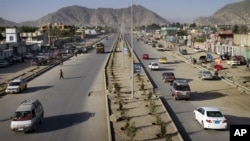A new U.S. audit finds major reconstruction projects in Afghanistan are running at least six months behind schedule and may never achieve the goal of helping win public support of the Afghan government over the Taliban.
The report from the Special Inspector General for Afghanistan Reconstruction, released Monday, says the U.S. and Afghan governments and the international community still face challenges in building Afghanistan's infrastructure, particularly the country's power sector.
Congress created the $400 million Afghanistan Infrastructure Fund to allow the U.S. State Department and Department of Defense to combine resources for projects to boost counterinsurgency efforts in the war-torn country.
But the inspector general's report finds that the completion of five of seven fiscal year 2011 projects have been delayed up to 15 months. Most of the projects focus on increasing the electricity supply in southern Afghanistan, including Kandahar province -- the birthplace of the Taliban insurgency.
The inspector general says as of February of this year, only two of the projects were under contract, with those deemed as key to counterinsurgency goals still not awarded to contractors. The delays were partly attributed to problems in the bidding process and in the transfer of funds from the Department of Defense to the State Department and ultimately to USAID.
Instead of winning popular support for the Afghan government, the audit finds that some of the Afghanistan Infrastructure Fund projects may instead hurt counterinsurgency goals, by creating an "expectations gap among the affected population, or because they lack citizen support."
In a written response to the report, the U.S. embassy in Kabul defended the projects, saying they "have signaled to Afghan populations the U.S. government's long-term commitment to Afghanistan."
But the audit finds that the sustainability of the projects rely "heavily on Afghan entities with questionable capacity," with many lacking the resources necessary to fulfill commitments. The report cites an example of an Afghan power utility's limited capacity to bill customers, collect revenues and maintain its infrastructure in Kandahar, after it takes control of U.S. government-procured generators.
When asked about the report, Afghan lawmaker Shukria Barakzai said "the U.S. needs to alter its approach in implementing development projects in Afghanistan. To get good results, the contracts should be awarded to the locals."
Another Afghan parliament member, Mohammad Akbari, agreed with the findings of the U.S. audit, saying that development work undertaken in Afghanistan does not match the amount of aid money donors claim they have spent. He says the lack of capacity, both in the government and donors, have contributed to mismanagement of development projects.
The report from the Special Inspector General for Afghanistan Reconstruction, released Monday, says the U.S. and Afghan governments and the international community still face challenges in building Afghanistan's infrastructure, particularly the country's power sector.
Congress created the $400 million Afghanistan Infrastructure Fund to allow the U.S. State Department and Department of Defense to combine resources for projects to boost counterinsurgency efforts in the war-torn country.
But the inspector general's report finds that the completion of five of seven fiscal year 2011 projects have been delayed up to 15 months. Most of the projects focus on increasing the electricity supply in southern Afghanistan, including Kandahar province -- the birthplace of the Taliban insurgency.
The inspector general says as of February of this year, only two of the projects were under contract, with those deemed as key to counterinsurgency goals still not awarded to contractors. The delays were partly attributed to problems in the bidding process and in the transfer of funds from the Department of Defense to the State Department and ultimately to USAID.
Instead of winning popular support for the Afghan government, the audit finds that some of the Afghanistan Infrastructure Fund projects may instead hurt counterinsurgency goals, by creating an "expectations gap among the affected population, or because they lack citizen support."
In a written response to the report, the U.S. embassy in Kabul defended the projects, saying they "have signaled to Afghan populations the U.S. government's long-term commitment to Afghanistan."
But the audit finds that the sustainability of the projects rely "heavily on Afghan entities with questionable capacity," with many lacking the resources necessary to fulfill commitments. The report cites an example of an Afghan power utility's limited capacity to bill customers, collect revenues and maintain its infrastructure in Kandahar, after it takes control of U.S. government-procured generators.
When asked about the report, Afghan lawmaker Shukria Barakzai said "the U.S. needs to alter its approach in implementing development projects in Afghanistan. To get good results, the contracts should be awarded to the locals."
Another Afghan parliament member, Mohammad Akbari, agreed with the findings of the U.S. audit, saying that development work undertaken in Afghanistan does not match the amount of aid money donors claim they have spent. He says the lack of capacity, both in the government and donors, have contributed to mismanagement of development projects.




